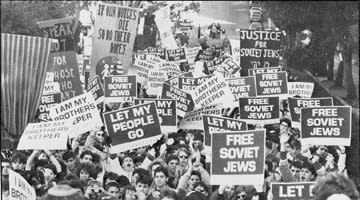
I’m going back to the 70s and a wicked winter in St. Paul, Minnesota. Winters in St. Paul can be brutal, especially if you’re a teen from another saint-city that’s over 500 miles further south. The trek from St. Louis to St. Paul meant a Greyhound bus all-nighter for the thirty of us who wanted to attend an NCSY winter conclave; I’d never participated in one before and wasn’t completely convinced it would be an optimal use of precious winter vacation days from school.
Everybody else knew somebody else from the various Midwest states in attendance, the advisory staff from New York was accorded rock-star status, and a live band played familiar tunes – still, an NCSY event is always a little bit of culture shock for the uninitiated; this has not changed despite the passage of time.
There’s something else that hasn’t changed, and in trying to nail down that certain something, I keep going back to the winter conditions of St. Paul. Go figure why one of the highlight events was a three-mile march to the steps of Minnesota’s capitol building? Back then, we were 750 candle-carrying Jewish teens who braved the weather in order to protest the plight of Soviet Jewry. The candle lighting was a catastrophe because of winter winds, and the news cameras documented the fact that most of us had not been intelligent enough to wear sensible boots or hats (or maybe we were just too cool to be caught dead in them). At the end of the evening, we were given metal wrist bands that contained the names of imprisoned Refuseniks, and with all the exuberance of youth we solemnly pledged not to remove them until the Refuseniks were released. Who knew I’d be wearing Anatoly Sharansky on my wrist until he finally arrived in Jerusalem in the mid 80s?
When I left St. Paul, I remember leaving with something more than just a wrist band, soggy socks, and frostbitten earlobes. “Empowerment” wasn’t a term back then, but that’s what NCSY was handing out; a magnificent feeling that even a teenager could do something that might make a difference on a much larger scale, could even have a voice on the world stage… and that, in a nutshell, is the secret of what youth always wants.
Rabbi Steven Burg (Keeping Our Kids on the Derech) and Bayla Sheva Brenner (Reaching the iPod Generation) have written eloquently on the subject of today’s teens who, despite an Orthodox Jewish upbringing and a day school education, lack the kind of passion that evolves into adult commitment. And yet, for over fifty years, NCSY has consistently developed this kind of enthusiasm, passion and commitment from public school teens who are being raised in non-observant environments. What’s the magic here… or are those teens simply rebels without a cause who end up finding one in a tradition abandoned by their elders?
For those of us former NCSYers who’ve transitioned past the turbulent years of adolescence and beyond the turbulent years of mid-life crises, it’s now a reality check; “causes” multiply exponentially over the decades and begin to wear thin with a healthy dose of adult cynicism. What always remains is the desire to feel that our actions make a difference in this world. That desire begins to awaken in the age of double-digits and teens naturally gravitate to anything which speaks to that need. The eternal rebellion of youth has always been against the idea of a meaningless existence.
If you think it’s not so, there’s some proof to be found in 1,200 Jewish teens from a diverse range of backgrounds who gathered recently at Mini-Israel for a highlight event known as “Yom NCSY” to celebrate the culmination of NCSY’s Israel summer programs. As Arutz Sheva described the participants, “many of the organization’s youth are located in areas where a Jewish community of any kind – let alone an Orthodox one – is miniscule, and one of NCSY’s top priorities is helping teens maintain their Jewish identity in circumstances where the easiest choice would be to assimilate.”
Identity is only one piece of the puzzle, the bulk of NCSY’s twelve unique summer programs reaches beyond touring and studying to include volunteer work and social services projects. An entire division of the organization (Yachad | National Council Jewish Council for Disabilities) is dedicated to the inclusion of Jewish individuals with special needs.
So what’s really changed since the 1970s? There are no more Soviet Jewish Refuseniks languishing in the Gulag. But if 1,200 Jewish teens in Jerusalem are merely rebels without a cause, NCSY International Director Rabbi Steven Burg certainly gave them one; a voice on the world-stage, and a way to make a difference on a much larger scale:
“Today, when we are witness to hostility and attacks on Israel, we need to increase our identity with Israel and become its ambassadors abroad. When we see you deepening your Jewish identity, volunteering and strengthening your connection to Israel, it shows how important it was for you to come on this trip to Israel.”
To find out more, please visit: NCSY Summer Programs
The words of this author reflect his/her own opinions and do not necessarily represent the official position of the Orthodox Union.
